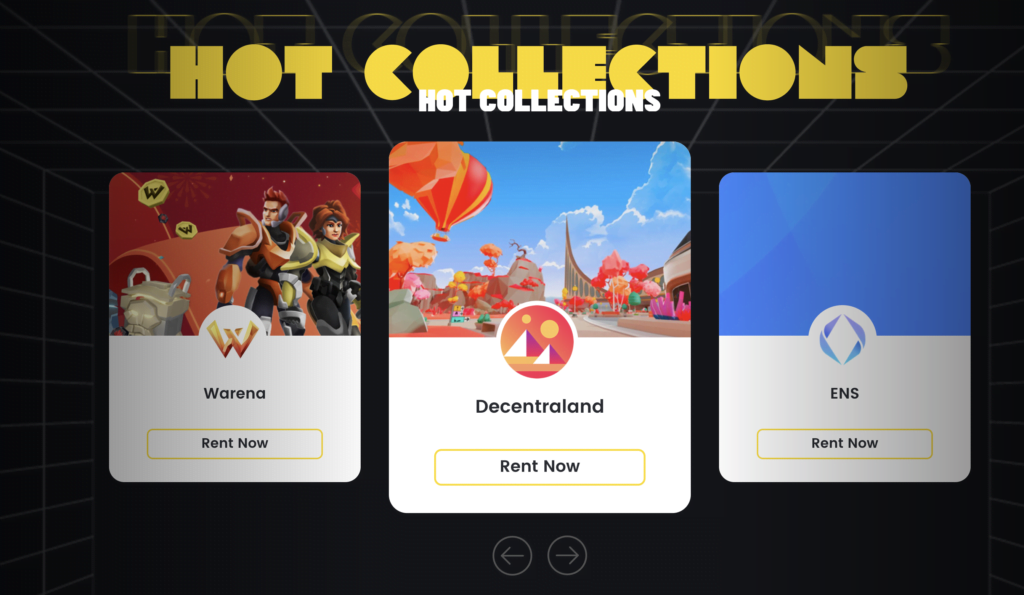NFT rental protocols provide the infrastructure to rent NFTs for a limited period. They allow transferring NFT user rights without transferring the NFT ownership. As a result, users who don’t own an NFT can still leverage its utilities, while the NFT owners can gain passive income.
How does NFT renting work?
Users can lend and borrow NFTs for a set period on the platforms deploying rental protocols. The lender lists an NFT on the marketplace and sets the rental terms, such as the number of days for renting. The borrower pays the rent and additional fees and hands back the NFT to the original owner at the end of the rental period.
Some protocols require collateralized renting, where the borrower must deposit the necessary collateral to rent the NFT. However, nowadays, non-collateralized renting is becoming the norm, as it lowers the barrier to accessing NFTs and is thus more appealing to borrowers.
After renters pay the required expenses, they receive a wrapped NFT, which represents the NFT the lender provided in the first place. A wrapped NFT (wNFT) is created by exchanging one token for another in an equal amount with a smart contract. The wNFT can include fungible or nonfungible collaterals and functions across different blockchains. When the rental period ends, it’s destroyed, and the original NFT returns to its owner.
The Web3 ecosystem uses rental protocols in many contexts. Let’s see some examples.
NFT renting of metaverse lands and in-game assets
GameFi assets make a lot of sense in terms of NFT renting. Usually, play-to-earn gamers need specific assets only until they reach a certain game level. During this time, they can simply rent the required in-game assets and give them back to the owners once they are done with those game items.
Metaverse NFTs are ideal candidates for renting, as well. Here, landowners can lend their lands to earn a steady revenue stream. At the same time, NFT renters can build experiences and host virtual events on the metaverse properties in their preferred timeframe.

The open-source, decentralized NFT rental protocol Double focuses on utility NFTs from the GameFi and metaverse ecosystems. The protocol currently enables renting NFTs with ERC-721- the most widely applied NFT standard- and ERC-1155. This protocol doesn’t require collaterals. Furthermore, the renters don’t need to pay network gas when they return the NFTs; instead, the protocol deploys automatic expiration at the end of the rental period.
Double has its own native NFT rental marketplace where you can borrow NFTs from several projects. It has integrations with more than 90 NFT projects, including metaverses Decentraland, Ariva Wonderland, MCH Verse, and projects from the game ecosystem, such as FitEvo and Xandar.
Rental protocols help gaming guilds improve their management processes
Guilds are essential players in the GameFi ecosystem. Here, scholarship providers rent out their NFTs to play-to-earn gamers. As different parties are involved, operations can turn complicated at times.
The rental protocol UnitBox works specifically in this area. It deploys a rent-to-earn model based on revenue sharing and makes rapid payouts to players and scholarship providers, supplying real-time metrics to track gamers’ performance.
▪️ #PlayToEarn Guilds remain an essential part of the #RentToEarn movement, but #UNITBOX Protocol makes the daily operations of #guilds more effective and productive.
— UNITBOX (@Rent2Earn) February 8, 2023
⬇️Why so? Check Thread!⬇️ pic.twitter.com/Q0dneAK5OD
Build your own NFT renting marketplace and custom solutions
As protocols provide the underlying framework, developers can build new NFT marketplaces with renting functionalities on top of them. For instance, by integrating with the NFT rental protocol, reNFT, decentralized apps can create whitelabel solutions that preserve the project’s front-end interface. It’s also possible to develop tailor-made NFT renting platforms.
New DeFi revenue streams
One of the highlights of reNFT is the protocol composability which facilitates collaborating with other protocols to unlock additional utilities.
For example, they can lend their NFTs while also fractionalizing them, benefit from “buy now, pay later” features to pay off their debts, and take collateralized loans against their NFTs.
IQ Protocol is another protocol that strives to broaden the scope of DeFi options in the context of NFT rentals. Consequently, renting out NFTs while benefiting from other utilities, like using them as concert tickets and accessing gated content, will be possible.
Thanks to features like protocol composability and extending NFT utilities during the renting period, Web3 participants can profit from many other DeFi opportunities based on NFTs they already hold in their portfolios.
Author

Nagi An is a content writer who is passionate about NFTs, web3, DAOs, and DeFi. She's covers a variety of topics about NFT fundamentals.




